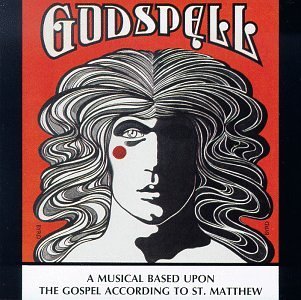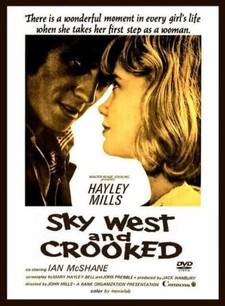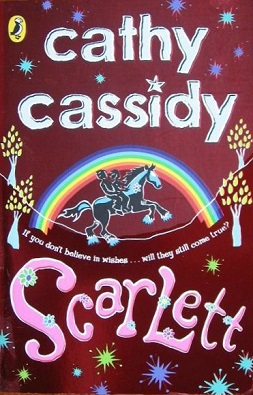
Whistle Down the Wind is a musical with music composed by Andrew Lloyd Webber, who also co-wrote its book with Patricia Knop and Gale Edwards, and its lyrics were written by Jim Steinman. It is based on the 1961 film Whistle Down the Wind, whose source novel of the same name was written by Mary Hayley Bell in 1958.

Godspell is a musical composed by Stephen Schwartz with book by John-Michael Tebelak. The show is structured as a series of parables, primarily based on the Gospel of Matthew, interspersed with music mostly set to lyrics from traditional hymns, with the passion of Christ appearing briefly near the end.

Far from Heaven is a 2002 independent period romantic drama film written and directed by Todd Haynes, and starring Julianne Moore, Dennis Quaid, Dennis Haysbert, and Patricia Clarkson. It premiered at the Venice Film Festival, where Moore won the Volpi Cup for Best Actress, and cinematographer Edward Lachman won a prize for Outstanding Individual Contribution.

Mark 14 is the fourteenth chapter of the Gospel of Mark in the New Testament of the Christian Bible. It contains the plot to kill Jesus, his anointing by a woman, the Last Supper, predictions of his betrayal, and Peter the Apostle's three denials of him. It then begins the Passion of Jesus, with the garden of Gethsemane and Judas Iscariot's betrayal and Jesus' arrest, followed by Jesus' trial before the Sanhedrin and Peter's denials of Jesus.

The Elephant Vanishes is a collection of 17 short stories by Japanese author Haruki Murakami. The stories were written between 1980 and 1991, and published in Japan in various magazines, then collections. The contents of this compilation were selected by Gary Fisketjon and first published in an English translation in 1993. Several of the stories had already appeared in the magazines The New Yorker, Playboy, and The Magazine before this compilation was published.

Trapped in the Closet is a musical soap opera series by American R&B singer, songwriter and producer R. Kelly, with 33 "chapters" released sporadically from 2005 to 2012. Written, produced, and directed by Kelly, the series tells a story of a one-night stand that sets off a chain of events, gradually revealing a greater web of lies, sex and deceit. The music follows a distinct E major pattern, and most chapters feature the same melodic theme.

Mark 10 is the tenth chapter of the Gospel of Mark in the New Testament of the Christian Bible. It presents further teachings of Jesus as his journey progresses towards Jerusalem.

Seeds of Yesterday is a novel written by V. C. Andrews. It is the fourth book in the Dollanganger Series. The story continues from the point of view of the protagonist, Cathy, following her from the age of 52 until her death a few years later. Cathy was born in April 1945, meaning the events in the book occur between 1997–2001, which was thirteen years into the future at the time the book was originally published in 1984. The film adaptation aired April 12, 2015 on Lifetime.

Garden of Shadows, a novel by V. C. Andrews, was first published in 1987. V. C. Andrews died in 1986, and her estate commissioned ghostwriter Andrew Neiderman to continue writing novels under her name developed from plot outlines originally written by Andrews. There is some dispute over whether this particular novel was written in part by Andrews before she died, or whether it was written entirely by Neiderman. This is the fifth novel of the Dollanganger series. The novel explains the origin of Olivia Winfield, the events that cause her to become the cold, domineering mistress of Foxworth Hall, and Corinne's childhood and eventual betrayal. It is the fifth novel of the Flowers in the Attic series but considered the prequel, as the story told takes place prior to the events of the first book. The story covers the years between 1918 and 1957.
"Never Too Old" is the last episode of the ninth and final series of the British comedy series Dad's Army. It was originally transmitted on Sunday 13 November 1977, the same day of the Remembrance Sunday 1977 Commemorations. The final ever episode marked the last regular appearances of Arthur Lowe, John Le Mesurier, Clive Dunn, John Laurie, Arnold Ridley and Ian Lavender.

Whistle Down the Wind is a 1961 British children's crime drama film directed by Bryan Forbes, adapted by Keith Waterhouse and Willis Hall from the 1958 novel of the same name by Mary Hayley Bell. The film stars her daughter Hayley Mills, who was nominated for the BAFTA Award for Best British Actress for this film.

Sky West and Crooked is a 1966 British romantic drama film starring Hayley Mills. The film was directed by her father, John Mills, and was co-written by her mother, Mary Hayley Bell.

Scarlett is a 2006 novel by Cathy Cassidy. It won the 2007 Royal Mail Award for Scottish Children's Books in the 12–16 age group. It reached number 8 in the Ottakars sales chart for children's books in June 2006. The plot revolves around the 12-year-old girl of the title, who is badly affected by the break-up of her parents. After leading a food fight at school, she is sent from London to live with her father in Ireland.

Whistle Down the Wind was a novella written by Mary Hayley Bell and illustrated by Ōven Edwards. It was published in 1958 by T.V. Boardman & Co. and retailed for 12 shillings and sixpence (62½p). The central characters are three children — Swallow, Brat and Poor Baby who are based on the author's own children Juliet, Hayley and Jonathan Mills. The story is narrated by Brat.

Trapped in the Closet is a 2007 musical comedy-drama film directed by R. Kelly and Jim Swaffield and written by Kelly based on the song of the same name. Released on August 21, 2007, the film follows protagonist Sylvester, a man who in order not to get caught cheating decides to hide in his affair's closet.

If There Be Thorns is a 2015 television film based on the best-selling 1981 novel of the same name. It premiered on April 5, 2015 and was produced by Lifetime. Seeds of Yesterday is the sequel film based on the novel of the same name.
Orange Flower Water is a dramatic play written by Craig Wright published in August 2004. The Chicago Tribune describes the play as "Uncommonly intense and intimate ninety-minute drama." "A brutally honest drama about marriage and infidelity" by Chicago Sun-Times, and "Simultaneously visceral, with crackling humor, and intellectual." by Star Tribune.

Don't Talk to Strange Men is a 1962 black and white British crime thriller film directed by Pat Jackson and produced at Marylebone Film Studios and on location in Buckinghamshire.

Knife+Heart is a 2018 horror-thriller film directed by Yann Gonzalez, who co-wrote the screenplay with Cristiano Mangione. It was produced by Charles Gillibert and stars Vanessa Paradis, Nicolas Maury, Kate Moran, Jonathan Genet and Romane Bohringer. An international co-production of France, Mexico and Switzerland, the film was selected to compete for the Palme d'Or at the 2018 Cannes Film Festival. The lead character is loosely based on Anne-Marie Tensi, a female producer specialized in gay pornography who was active in France in the 1970s and 1980s.















